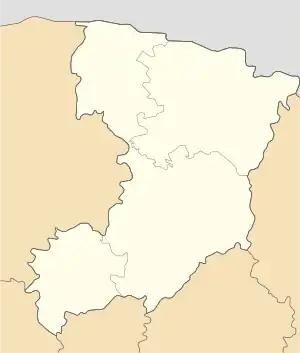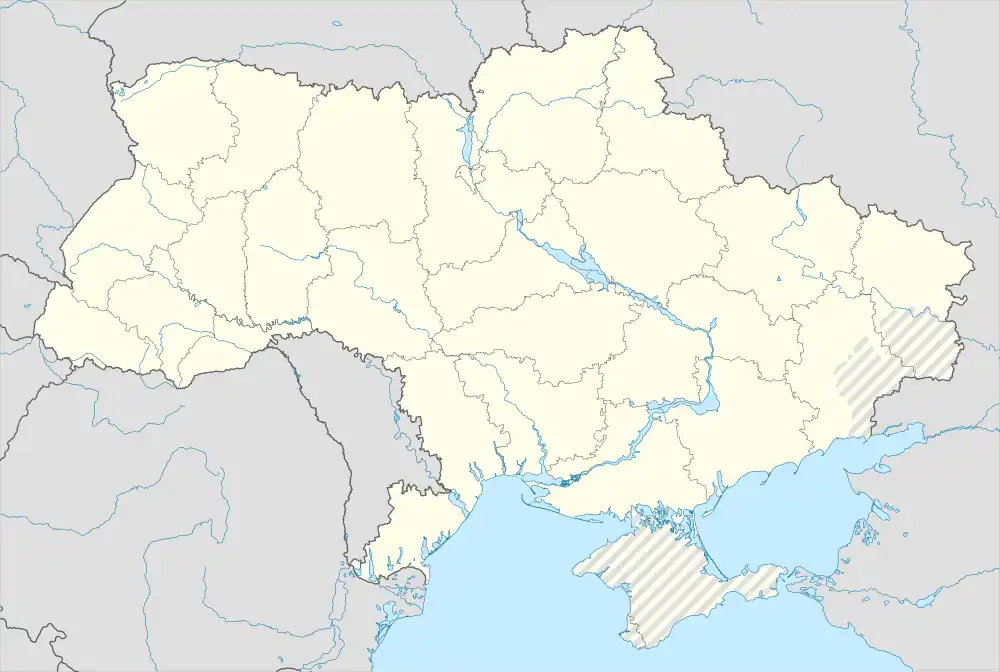Derazhne
Деражне | |
|---|---|
Village | |
 Flag  Coat of arms | |
 Derazhne Location within the Ukraine  Derazhne Derazhne (Ukraine) | |
| Coordinates: 50°51′44″N 26°02′58″E / 50.86222°N 26.04944°E | |
| Country | |
| Oblast | Rivne Oblast |
| Raion | Rivne Raion |
| Silska Rada | Derazhne Silska Rada |
| Founded | 1274 |
| Area | |
| • Total | 4.87 km2 (1.88 sq mi) |
| Elevation | 175 m (574 ft) |
| Population (2001) | |
| • Total | 2,102 |
| • Density | 431.36/km2 (1,117.2/sq mi) |
| Time zone | UTC+2 (EET) |
| • Summer (DST) | UTC+3 (EEST) |
| Postal code (Index) | 35053 |
| Area code | +380 3657 |
Derazhne (Ukrainian: Деражне, Polish: Deraźne, Russian: Деражное) is a village in western Ukraine, in Rivne Raion of Rivne Oblast, but was formerly administered within Kostopil Raion. In 2001, Derazhne had 2102 residents. Postal code — 35053.[1] KOATUU code — 5623481601.
History
Derazhne was mentioned for the first time in the historical sources in 1272.[2] In 1626, Prince Janusz Ostrogski has built here a church of the Holy Trinity. A new stone catholic church was built in 1804, and an orthodox church in 1824.[3] A Karaite Jewish (Karaim) community existed in Derazhne since the late 1500s.[4] The community was severely damaged during the Chmielnicki uprising in 1649, and two poems about the destruction were written in Hebrew and in Turkic Karaim language by the leader of the congregation, Hazzan Joseph ben Yesh'uah Ha-Mashbir.[5] Apparently, a small Karaite community survived until the Haidamakas uprising in 1768[6]
During the Second Polish Republic (1918-1939) Derazhne was the seat of the rural municipality in the district of Rivne Derażne, and from 1 January 1925, of Kostopol Volyn province. The Jewish population constituted 624 persons in 1921.[7] After the Nazi German troops entered Derazhne on June 28, 1941, the ghetto was organized on October 5, 1941, and it was liquidated on August 24, 1942.[8] 1,868 Jews were killed altogether in the nearby village of Osowa Wyszka by an Einsatzgruppen.[9] About 70 Poles were also killed during the war with only one surviving Polish family. Murdered by Ukrainian policemen in German service and members of the Ukrainian Insurgent Army. [10]
Ukrainian artist and OUN activist Nil Khasevich (1905-1952) served as a Judge in Derazhne during the Nazi occupation period in 1941.[11] Ukrainian and Russian poet Rostislav Zass (1940-1999) lived for many years and was buried in Derazhne. In 2010, a memorial for Ukrainian Insurgent Army freedom fighters was built in Derazhne.[12]
References
- ↑ Registration card Archived 2012-03-11 at the Wayback Machine on the website of the Verkhovna Rada of Ukraine (in Ukrainian)
- ↑ Derazhne
- ↑ Шабаровський В. В. (2006). Деражно: Хрестовоздвиженська церква на тлі історії. Рівне: Азалія.
- ↑ Nosonovsky, M.; Shabarovsky, V. (2005). "Караимская община XVI-XVIII веков в Деражном на Волыни". Vestnik EUM. 9: 31–52.
- ↑ Nosonovsky, M. (2011). "The Karaite Community in Derażne and its Leader Hazzan Joseph ben Yeshu'ah". Eastern European Karaites in the Last Generations: 17–35.
- ↑ Шабаровський, В. В (Shabarovsky, V.V.) (2013). Караїми на Волині (Karaites in Volhynia, in Ukrainian). Lutsk: Tverdynya.
{{cite book}}: CS1 maint: multiple names: authors list (link) - ↑ Холокост на территории СССР: Энциклопедия, Moscow, 2009, ISBN 978-5-8243-1296-6 s.263
- ↑ "Yahad - in Unum".
- ↑ Władysław Siemaszko, Ewa Siemaszko, Ludobójstwo dokonane przez nacjonalistów ukraińskich na ludności polskiej Wołynia 1939-1945, Warszawa 2000, ISBN 83-87689-34-3, s.219
- ↑ E. Siemaszko, W. Siemaszko, Ludobójstwo dokonane przez nacjonalistów ukraińskich na ludności polskiej Wołynia 1939-1945, Warszawa 2000 , Wydawnictwo "von Borowiecky"; ISBN 83-87689-34-3, t.I, s.219-221
- ↑ ладков, Теодор; Стекляр, Борис. Рассказы полковника Бондаря // Чекисты рассказывают / Составитель В. Листов. — М.: Советская Россия, 1985. — Т. 6. — С. 121—178.
- ↑ "У селі Деражне відкрили пам'ятник борцям за незалежність України". Archived from the original on 2019-01-21. Retrieved 2014-06-11.
External links
- Article Derażne in the Geographical Dictionary of the Kingdom of Poland, Volume I (Aa — Dereneczna), 1880 year
![гранит[permanent dead link] цена](../I/Derazhne_s.png.webp) (in Polish)
(in Polish) - Weather in Derazhne (in Ukrainian)
- Derazhne, Ukraine at JewishGen